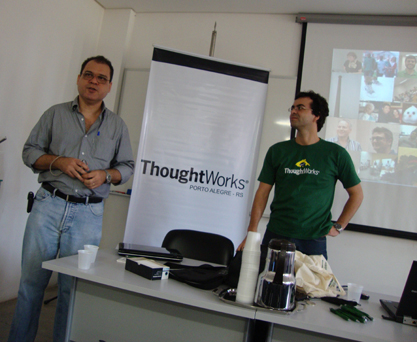On May 15th, I had the pleasure of attending what I expected to be just another coffee-fueled agile meetup in Recife. But Café Ágil, hosted by ThoughtWorks Brazil and UFPE, offered far more than caffeine. It brought together leaders, students, and developers who weren’t there just to listen — they came to challenge, to ask, and to reframe how we practice.
XP: Against or in Favor of Design?
The day began with Paulo Caroli, who opened provocatively: Is XP against design? His answer was nuanced. XP isn’t anti-design — it simply challenges the timing of design decisions. Instead of a “design phase” upfront, XP encourages design in flow — architecture that evolves through delivery, informed by feedback.
Drawing from his own career and influences from Kent Beck, Caroli revisited the 4 values and 12 practices of XP, emphasizing that communication, simplicity, feedback, and courage remain as vital today as they were in 2000. In XP, design doesn’t disappear — it matures alongside the product.
Caroli contrasted XP with the rigid, waterfall-style lifecycle. Where traditional models isolate analysis, design, coding, and testing, XP blurs the boundaries. The benefit? Less waste, more informed decisions, and a tighter feedback loop.
TDD from the Trenches: Culture Eats Practice for Breakfast
Next up was Luiz Borba from Pitang, who shared the very real, very honest challenges of introducing TDD in a working dev team. According to Borba, test-driven development wasn’t initially driven by engineering enthusiasm, but by client demands for quality and trust.
Even after training sessions, developers would revert to coding without tests unless reminded. Why? Because culture wins. TDD isn’t just a technical discipline — it’s a mindset. It requires support, repetition, and collective discipline.
Borba’s key point: once teams get used to TDD, they can’t go back. The absence of tests feels unsafe. And when managers support the habit, TDD shifts from trend to quality investment.
Best Conversations Happen in the Hallway
Outside the sessions, the informal chats were just as valuable. I discovered SCRUM Paraíba (a community I hadn’t heard of before), and we discussed differences between regional markets, the role of universities, and the frustrating gap between academic theory and real-world pressure.
Respect came up often — as a value, as a team habit, and as an agile foundation. Respect for people’s time in code reviews, respect for the client’s constraints, respect for the pace of learning. As one attendee put it, “Respect is what keeps collaboration honest.”
Wrapping Up with Pens, Coffee, and Invites
The event ended with giveaways (yes, I grabbed a pen!) and more importantly, a call to action. The discussions shouldn’t stay locked in that room — they should echo through our teams, our dailies, and our design reviews.
Café Ágil reminded me that agility isn’t about frameworks — it’s about communities that learn in public. With courage to evolve, with code that tells stories, and with people who still believe that listening is just as important as delivering.
Props to the organizers and speakers. May there be many more events like this one.
Links and Resources:
